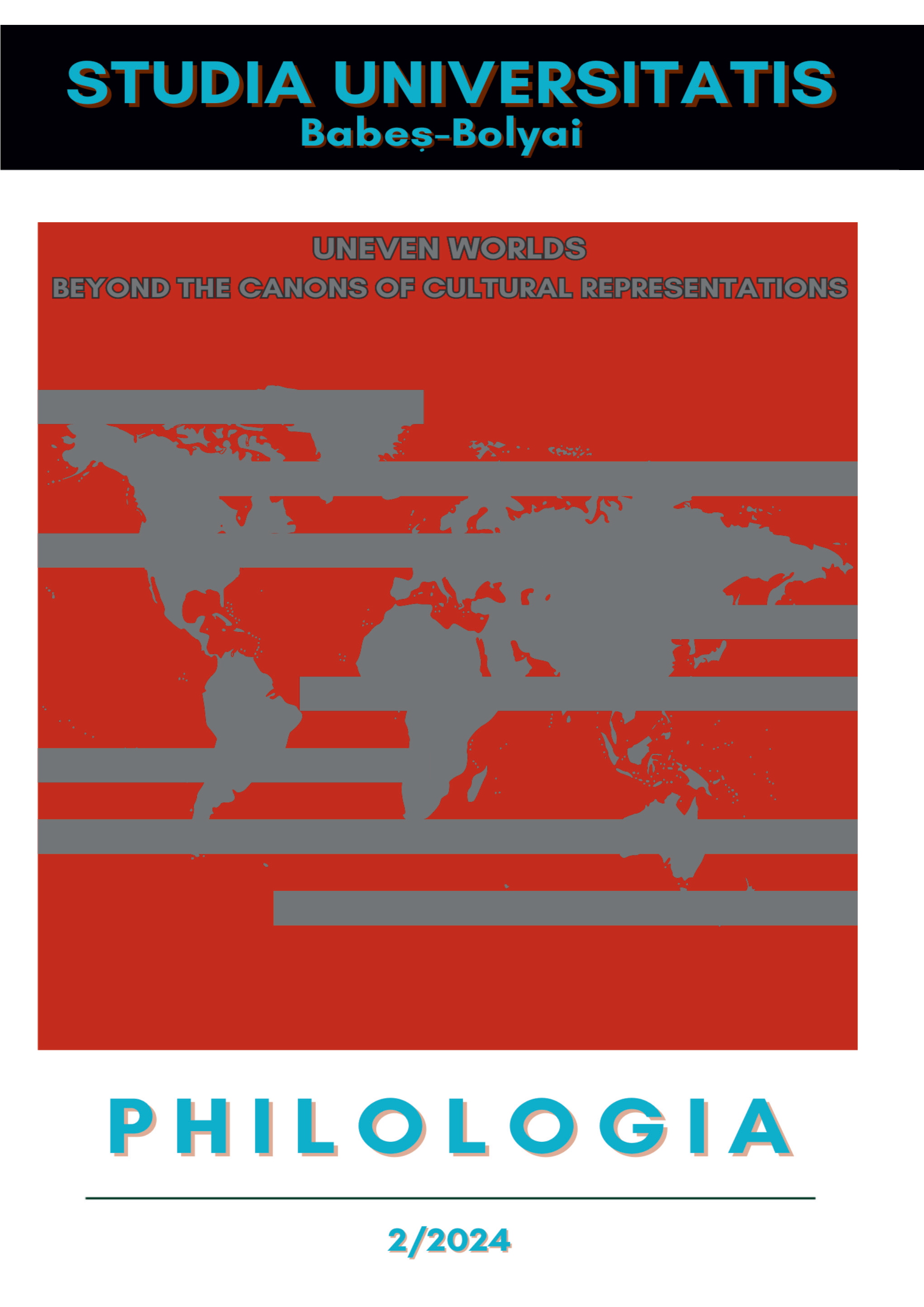LISTENING AND LEGIBILITY: URBAN SURFACES AGAINST ‘OVERARCHING MEANINGS’ IN LISPECTOR’S THE BESIEGED CITY
DOI:
https://doi.org/10.24193/subbphilo.2024.2.03Keywords:
poiesis, totality, Global South, creolization, urban, listening, modernityAbstract
Listening and Legibility: Urban Surfaces Against “Overarching Meanings” in Lispector’s The Besieged City. This paper looks into the literary dismantlement of projections of totality and objectified knowledge in women’s modern writing, focusing on Brazilian writer Clarice Lispector’s novel The Besieged City. My central claim is that her writing opposes “geographies of reason,” indirectly arguing for an untranslatability of the self inside modernity’s model of legibility and communication. In this novel, Lispector’s alternative to the discoursing, male-dominant, rational public realm is not the introspective inner space of subjectivity, but an innovative world-making poiesis founded on the substitution of the individual self with “the wider life of the world” that remains always a-centric and anti-textual. I investigate the ways in which Lispector opposes opaqueness to legibility, seeking the uncharted territory outside the logic of historical time or the colonial gaze. Reading Lispector’s novel through the notion of “writing by ear” (bearing multiple meanings, mostly in relation to the re-negotiation of the voice-dominant Western perception about writing) will prove useful in understanding the intricate and tangled relation between Euro-American literature and the Global South in terms of complex forms of heritage hybridization and designs of global memory.
Ascultare și lizibilitate: Suprafețe urbane împotriva „semnificațiilor globale” în The Besieged City de Lispector. Acest articol investighează destructurarea proiecțiilor unei „totalități” și a cunoașterii obiective în scriitura modernistă feminină, cu focus pe romanul scriitoarei braziliene Clarice Lispector The Besieged City (Orașul asediat). Argumentul central se construiește pe ideea că scriitura sa se opune unor „geografii ale rațiunii,” demonstrând intraductibilitatea sinelui în interiorul modelului de lizibilitate și comunicare al modernității. În acest roman, alternativa scriitoarei la sfera publică raționalizată și discursivizantă nu este spațiul introspectiv al subiectivității, ci un poiesis al construirii de lumi, clădit pe substituirea sinelui individual cu „viața mai cuprinzătoare a lumii” care este anti-textuală și acentrică. Mă interesează modurile prin care Lispector opune opacitatea lizibilului, căutând „ținutul” neexplorat dinafara logicii timpului istoric și a privirii coloniale. Citind romanul lui Lispector prin conceptul de „scriitura cu urechea” (noțiune ce negociază percepția vestică asupra scrisului, dominată de ideea de „voce”) vom înțelege relațiile complexe dintre literatura euro-americană și cea a Sudului Global, cu atenție față de formele de hibridizare a memoriei în designul global.
Cuvinte-cheie: poiesis, totalitate, creolizare, urban, ascultare, modernitate, marginalitate
Article history: Received 05 February 2024; Revised 04 April 2024; Accepted 10 April 2024;
Available online 25 June 2024; Available print 30 June 2024.
References
Apparudai, Arjun. 1996. Modernity at Large: Cultural Dimensions of Globalization, Minneapolis: University of Minnesota Press.
Drabinski, J. E. 2019. Glissant and the Middle Passage: Philosophy, Beginning, Abyss. Minneapolis: University of Minnesota Press.
Eliot, T. S. 1954. Selected Poems. London: Faber and Faber Ltd Bloomsbury House.
Fitz, Earl E. 2001. Sexuality and Being in the Post-Structuralist Universe of Clarice Lispector: The Différance of Desire. Austin: University of Texas Press.
Glissant, Édouard. 1997. Poetics of Relation. Translated by Betsy Wing. Ann Arbor: The University of Michigan Press.
Habermas, J. 1987. The Philosophical Discourse of Modernity: Twelve Lectures. Cambridge: Polity Press.
Landes, J. B. (ed.) 1998. Feminism, the Private and the Public. Oxford: Oxford University Press.
Librandi, M. 2018. Writing by Ear: Clarice Lispector and the Aural Novel. Toronto: University of Toronto Press.
Lispector, Clarice. 2019. The Besieged City. Translated by Johnny Lorenz. Edited by Benjamin Moser. London: Penguin Random House.
Menon, Dilip M. 2018. “Thinking about the Global South: Affinity and Knowledge.” In The Global South and Literature, edited by Russell West-Pavlov, 34-44. Cambridge: Cambridge University Press.
Miles, Malcolm. 2019. Cities and Literature. New York: Routledge.
Rabaté, J. M. 2023. “Modernism and Totality.” Comparative Studies in Modernism, no. 22 (Spring): 15-26.
Rancière, Jacques. 2009. “Contemporary Art and the Politics of Aesthetics.” In Communities of Sense: Rethinking Aesthetics and Politics, edited by Beth Hinderliter, William Kaizen, Vered Maimon, Jaleh Mansoor, and Seth McCormick, 31-50. London: Duke University Press.
West-Pavlov, Russell (ed.). 2018. The Global South and Literature. Cambridge: Cambridge University Press.
Downloads
Published
How to Cite
Issue
Section
License
Copyright (c) 2024 Studia Universitatis Babeș-Bolyai Philologia

This work is licensed under a Creative Commons Attribution-NonCommercial-NoDerivatives 4.0 International License.





 ©Studia Universitatis Babeş-Bolyai Philologia. Published by Babeș-Bolyai University.
©Studia Universitatis Babeş-Bolyai Philologia. Published by Babeș-Bolyai University.